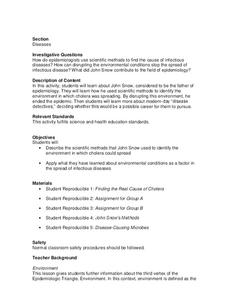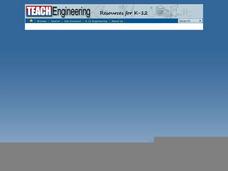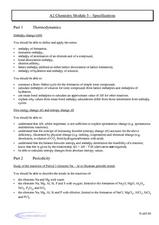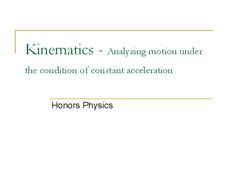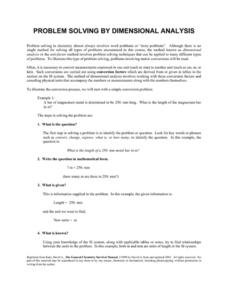Habitat Conservation Trust Foundation
Greenhouse Gas Game
You will need to gather a number of tokens, bags, and other various game components in order to incorporate this activity into your curriculum. Different tokens represent carbon dioxide, methane, and nitrous oxide. Printable 8.5"x11"...
Centers for Disease Control and Prevention
Diseases
During a cholera outbreak, scientists presented two theories; one theory was based on miasma and the other on germs and contaminated water. The instructional activity looks at the scientific process for finding the real culprit.
Space Awareness
Oceans on the Rise
Temperature rises and land disappears! Through a lab exploration, learners understand the effect of temperature increase on water similar to the effect of global warming on our oceans. As they heat the water in a flask, they measure the...
Cornell University
Spectral Analysis with DVDs and CDs
Build a spectrometer to analyze properties of light. Scholars examine the spectrum from CDs and DVDs from two different light sources. Using the spectrum, they work to identify different elements.
Serendip
How Do Biological Organisms Use Energy?
When an organism eats, how does food become energy? Young biologists follow glucose through the process of cellular respiration to the creation of ADP using a discussion-based activity. The resource also highlights conservation of mass...
Teach Engineering
Both Fields at Once?
An MRI uses both a magnetic and electricity, so how do the two interact with each other? Class members observe the effects on a charged particle when it is subject to both an electrical and magnetic field. The teacher background...
Curated OER
Chemistry Module 5 - Specifications
While this resource does not provide problems for chemistry learners to solve, it outlines skills that they should have and concepts that they should grasp. Topics include thermodynamics, periodicity, redox equilibria, transition metals,...
Curated OER
Diploid Genetics and Chromosomal Inheritance
Given the phenotypes of offspring in mice, flowers, and human blood type, genetics pupils practice determining the genotypes of the parents. Four short answer questions follow. The entire assignment will require learners to put on their...
Bowels Physics
Kinematics
Lead your class on a speedy journey as you present an effective lesson on kinematics. Individuals review speed, acceleration, and velocity before completing several practice problems to integrate the concepts.
Chymist
Problem Solving by Dimensional Analysis
Is your class in another dimension with regards to dimensional analysis? Give them some extra practice with a straightforward activity. Learners convert units by following concise step-wise examples, including setting up the problems....
Science Geek
Bulk Properties of Water
Learn the ins and outs of the properties of water through an engaging slide show. The lesson presents different facts about water including phase change, heat of fusion, heat of vaporization, and specific heat among others.
Georgian Court University
Introduction to Marsh Ecology
Compare and contrast the characteristics of fresh and salt water marshes. After exploring the typical plants and animals found in each marsh type, participants use a set of flash cards to sort into fresh and salt water marsh life. Their...
Bowels Physics
Electrostatics
Explore behavior of particles that cannot be seen with a detailed PowerPoint presentation that outlines the basics of electrostatics. The presentation addresses the charge of subatomic particles, conductors and insulators, and induction...
University of Southern California
How do Organisms Interact?
Examine how organisms interact through a hands-on experience. Learners study population dynamics and distribution during an informative five-lesson unit. The focus is on the ocean environment and the organisms within it.
Cornell University
Diffraction Demystified
Study diffraction patterns using CDs and DVDs! Scholars measure the diffraction patterns of a light wave as it hits a CD or DVD. Using the information, they can measure the distance between the tracks.
University of Texas
Lives of Stars
Stars exist from a few million years to over 10 billion years, depending on their mass. Scholars perform a play acting as stars to learn about their different life cycles. They develop an understanding of many of the fundamental concepts...
Curated OER
Biggest Trees in the United States
Students use the Internet (or printed sources) to locate information. They fill in missing information on a graphic organizer (chart) and use the data to answer questions. The research skills help students to develop higher order...
Curated OER
Be a Problem Solving Star
Second graders investigate the skill of solving problems. They have class discussion about problem solving and identify the steps in settling conflicts. The strategies are demonstrated for application to problem situations and student...
Curated OER
How Does Your Tree Measure Up?
Middle schoolers work in pairs or small groups to gather data about a tree. Each group might gather data about a different tree; all groups might collect data about the same tree; or two teams might gather data about each tree and...
Curated OER
What Does the Sun Give Us?
Pupils study the sun and how solar energy works. To learn about renewable energy, they complete a lab activity using a pizza box as a solar heater. Quite clever!
Curated OER
Cool Liquids
Chemistry neophytes use a temperature probe to assess the change as five different liquids evaporate. The implantation section suggests that they take readings every five seconds for a total of four minutes. They graph the data, look up...
Curated OER
Chemical Changes
Eighth graders observe two types of interactions in a sealed plastic bag. One bag contains baking soda and water, and the other baking soda and vinegar. They determine what evidence indicates that a chemical change is occurring.
Curated OER
Magnifiers
Students describe how several different objects magnify a provided sentence and decide if they are good magnifiers or not. They then write a sentence describing two properties an object must have in order to be a good magnifier.
Curated OER
Separation of a Complex Mixture
Students develop a method to separate different types of mixtures. In this chemistry activity, students model the steps in the scientific method. They perform the experiment and analyze data.



